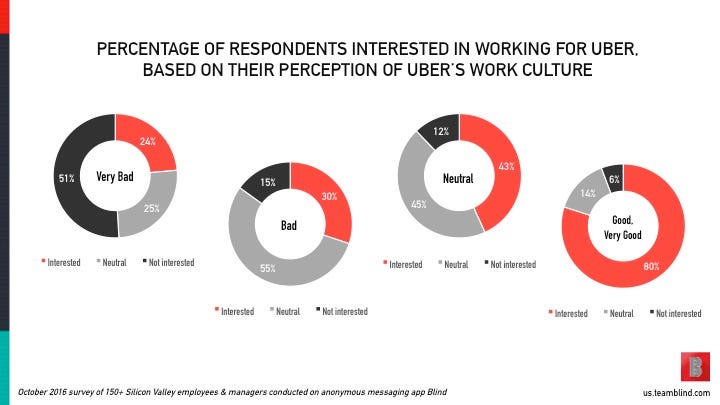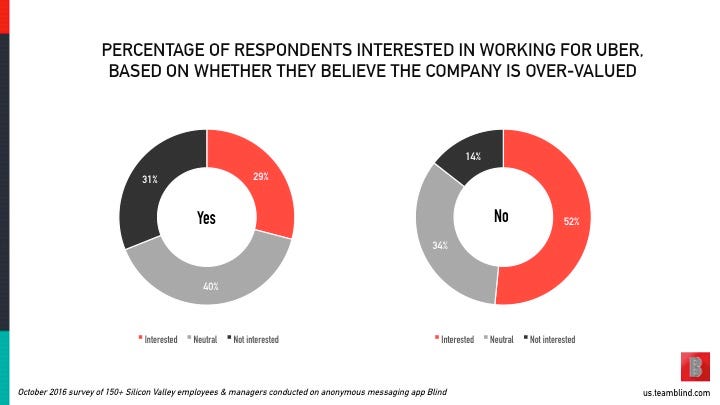Blind Survey: What the Valley Really Thinks About Uber

FEATURED IMAGE | Source: Teamblind Inc.
Overvalued, over-hyped and toxic — according to anonymous poll of employees & managers at top Valley tech companies.
Now that Sarah Lacy of Pando has reported that 73% of Blind users see Uber’s corporate culture as “bad/very bad”, here are the rest of our findings. First, some background:
In fact, “Uber” is the very top-searched discussion keywords among Blinders, trailing right behind “Salary”, “Google” and far out-pacing searches for “offers”, “interview” — and even “sex”!
Clearly, our community is interested in Uber. But what do they really think about the key topics surrounding the famed startup — their constant battle with the media and unprecedented funding from the middle east, Uber’s goal of becoming a completely driverless system and controversies around their culture? Using an in-app polling system we added during a recent update, we asked 7 questions related to this topic and collated answers from 150 anonymous employees and managers based in Silicon Valley — 1 in 5 of whom are with potential competitors Apple, Google, and Lyft.
We think these answers provide some pretty fascinating insights into Uber’s future — especially as Kalanick’s company continues trying to hire new employees to maintain growth. Here are the results:
Do You Want to Work for Uber?
Less than 1 in 5 Valley employees and managers who took our survey stated any interest in working for Uber, even though the company is widely seen as the hottest startup on the market. Feedback like this should concern Uber management as they continue expanding, and hope to continue hiring the best and brightest of the Valley.
But why are so many people in tech not interested in joining Uber? The other questions in our Blind poll may offer some understanding into that — starting with perception of Uber corporate culture:
What’s Your Opinion on Uber Corporate/Work Culture?
Nearly 3 in 4 respondents perceive Uber’s work-life and culture as being “bad” or “very bad”, contrasted by a mere 5% who have a positive view. This may partly reflect reported stories of Uber’s aggressive company behavior, and also, conversations within Blind itself. Several community members tell us that horror stories from Uber employees are a frequent topic in our Tech Lounge.

Unsurprisingly, perception of Uber’s work culture has a profound influence on employment interest, with the 80% of the 5% who see it as “Good/Very Good” wanting to work there — and just 24% to 30% who see it as “Bad/Very Bad” interested in Uber career opportunities. That’s actually a substantial minority. Some in Silicon Valley apparently expect startup and work life to be stressful or even miserable, and are willing to make allowances for that — especially if there’s a chance at being part of an epic IPO, or helping drive truly innovative technology.
Which takes us to our next set of questions:
Is Uber Over-Valued?
Answering the question that’s top-of-mind for most tech business news readers: Nearly 3 in 4 of our respondents believe Uber is over-valued. This is not entirely surprising given Uber’s massive valuation of $68 billion; and to look at this data from the other direction, it’s notable that a significant minority believe that this valuation is accurate.
But perhaps more surprising is how this opinion directly impacts whether Valley staff actually want to work for Uber:

Silicon Valley staffers’ opinion of Uber’s valuation has a strong impact on their desire to work for Uber: Among those who believe the startup is over-valued (“Yes”), only 29% are Interested in joining team Uber. For those who think Uber is not over-valued (“No”), interest nearly doubles, to 52%. (Though again, almost 3 in 4 fall into the over-valued category.)
We see similar, noteworthy trends in our questions about Uber’s goal to become completely automated:
A large majority believe Uber will go fully driverless in 5–10 years, with less than 1 in 4 believing it will happen sooner. Again, bear in mind that 20% of these answers are from employees and managers at Apple, Google, and Lyft, who are more likely to have direct knowledge on the difficulty of implementing self-driving systems.
Now let’s look at how the self-driving car question impacts desire to work for Uber:
This is personally the most interesting result of this entire poll. When confident in Uber’s ability to go fully autonomous is high, so is the willingness to work there — among the cohort of those who think the startup will reach that point in less than 5 years, a majority want to work there. For our respondents at least, innovation seems even more important than personal well-being.
I hope to post more anonymous polls from Blind soon. If you have burning questions you’d like to ask our brilliant users, please post suggestions in the comments!